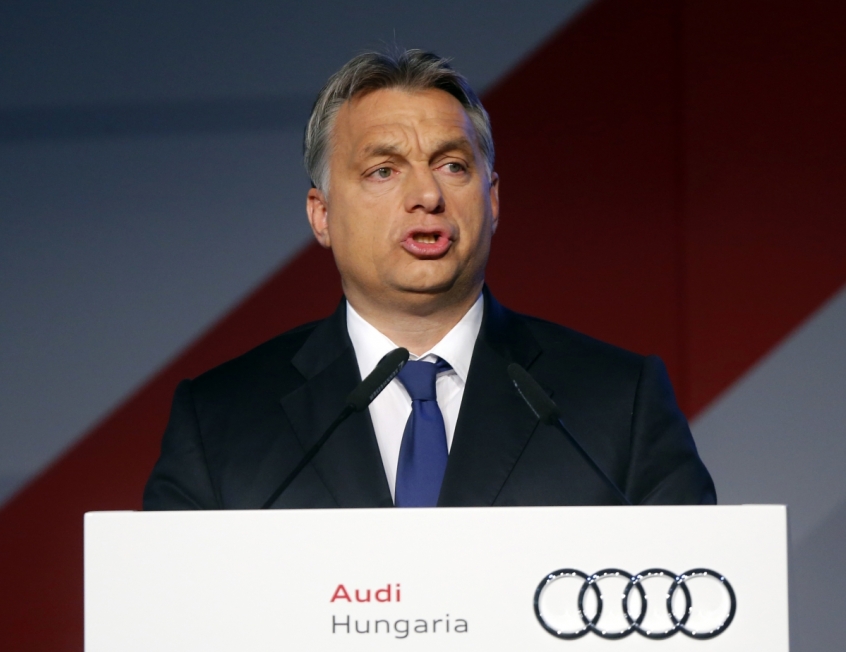Hungary's right-wing, nationalist prime minister Viktor Orban said yesterday that the main task of his new government will be to preserve the country's security and Christian culture, keeping out migrants and fending off what he calls foreign meddling.
Orban, 54, was re-elected for a third straight term in an election last month after a strong anti-immigration message helped to give him a landslide victory.
He said he is creating an 'old-school Christian democracy'.

One of the most vociferous opponents of immigration into Europe by mainly Muslim people fleeing war and poverty in the Middle East and Africa, Orban's campaign – helped by his party's media dominance – apparently resonated with large swathes of the electorate, particularly in rural areas.
His Fidesz party now holds 133 of 199 seats in the new parliament that will enable Fidesz to pass any laws, even those that require the support of two-thirds of the votes.
'The main task of the new government will be to preserve Hungary's security and Christian culture,' Orban told a news conference after he was asked by the president to form a new government.
Parliament will hold its first session today where Orban will be officially elected prime minister again.
In a radio interview on Friday, Orban said: 'We are working on building an old-school Christian democracy, rooted in European traditions...we believe in the importance of the nation, and in Hungary we do not want to yield ground to any supranational business or political empire.'
Orban has accused non-governmental organisations (NGOs), funded by the Budapest-born billionaire George Soros, of political meddling and actively supporting migration.
He said any organisation involved in the migration issue would have to seek clearance from national security authorities.
One of the first new laws expected to be passed by parliament is a 'Stop Soros' bill, which would impose a 25 per cent tax on foreign donations to NGOs that back migration.
Soros has said the attacks against him were 'lies and distortions' and were designed to create a false external enemy.
Orban, who declared in February that 'Christianity is Europe's last hope', claimed last month that Hungary's future would be decided for decades by the recent election, as the nationalist leader vowed to protect his nation from the 'rust' of Muslim migrants.
Also last month, Orban claimed common cause with Poland, whose governing Law and Justice (PiS) party has been criticised by the EU over its refusal to take in migrants under a quota system and over their efforts to tighten state control of their courts and media.
'We believe Poles and Hungarians have a common path, common fight and common goal: to build and defend our homeland in the form that we want...Christian and with national values,' Orban said at the unveiling of a statue marking a 2010 plane crash in Russia that killed the Polish president.
That president's twin brother, now Poland's PiS leader, Jaroslaw Kaczynski, endorsed Orban while attending the ceremony commemorating the plane crash.
In February, Orban declared that 'Christianity is Europe's last hope' after accusing politicians in Brussels, Berlin and Paris of ushering in the 'decline of Christian culture and the advance of Islam'.
During his annual state of the nation speech, Orban called for a global alliance against migration as his populist Fidesz party began campaigning for yesterday's election.
He said his government will oppose efforts by the United Nations or the European Union to 'increase migration' around the world.
And he claimed that Islam would soon 'knock on Central Europe's door' from both the west and the south.
In a populist rallying cry, Orban insisted that Western Europe is being overtaken by Muslims, before claiming that 'born Germans are being forced back from most large German cities, as migrants always occupy big cities first'.
The politician, who has been prime minister since 2010, is popular in Hungary but is increasingly at odds with mainstream European Union politicians and appears to thrive on controversy, including repeated clashes with Brussels.
Orban said in his speech at the Royal Castle in Budapest: 'Christianity is Europe's last hope. Our worst nightmares can come true. The West falls as it fails to see Europe being overrun.'
Domestically, Orban is popular partly because he is widely credited with reversing an economic slump in Hungary and controlling its public finances.
Additional reporting by Reuters.













